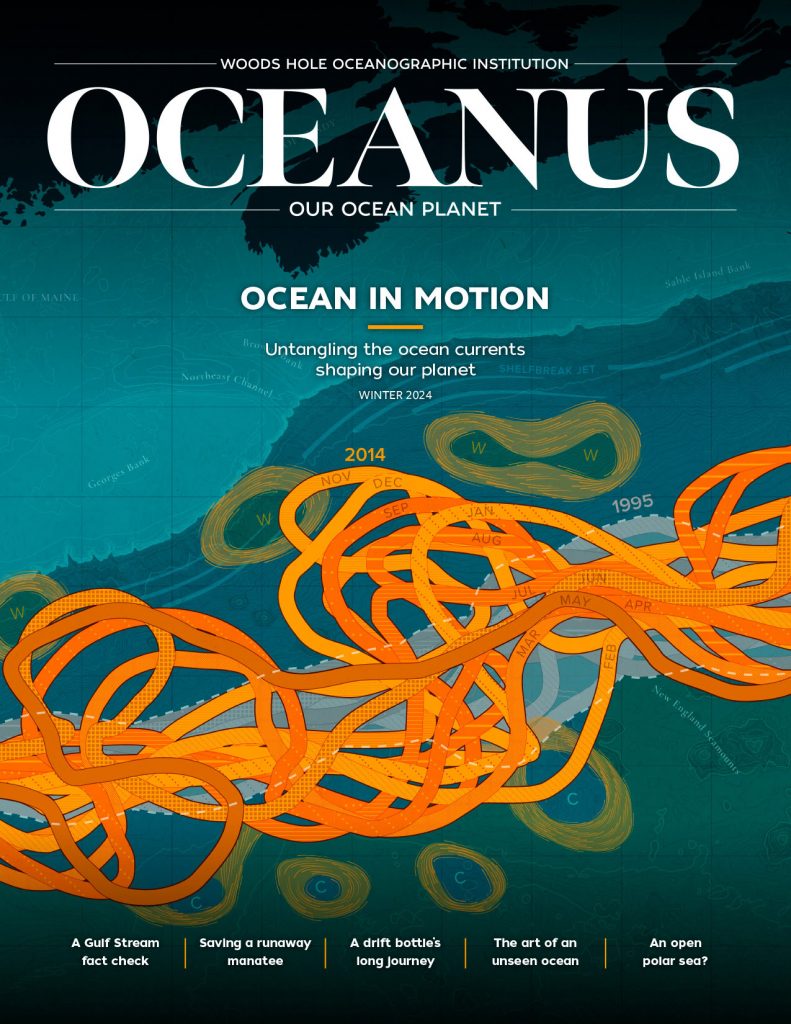Frozen Ocean
There are growing fears of an alarming shift in Antarctic sea ice
World’s largest iceberg breaks free, moving toward open sea
A23a: World’s biggest iceberg on the move after 30 years
Comprehensive study of West Antarctic ice sheet finds collapse may be unavoidable
Sea ice is shrinking. These maps show by how much
The Arctic and Antarctic saw record warmth and ice melt in 2022
U.S. Icebreaker Marks Third Visit to the North Pole
From icebergs to smoke, forecasting where dangers will drift
Some of these drift detectives want to know if large icebergs threaten offshore oil platforms. Others hope to track plumes of polluted air or water — and determine where they’re coming from. The work is challenging. It also can be very rewarding.
‘Tiger Stripes’ on a Saturn Moon Could Be Even More Unique Than Previously Thought
Icy moons that have (or are thought to have) subsurface oceans are common in the outer solar system. For example, Jupiter has several of them. These form when gravity from the planet they orbit stretches and squeezes their interior.
Rise and fall of water blisters offers glimpse beneath Greenland’s thick ice sheet
The findings could shed light on how climate change will affect Greenland’s vast frozen interior as the planet warms and surface melting increase.
Melting ice imperils 98% of Emperor penguin colonies by 2100
WASHINGTON (AP) — With climate change threatening the sea ice habitat of Emperor penguins, the U.S. Fish and Wildlife Service on Tuesday announced a proposal to list the species as threatened under the Endangered Species Act. “The lifecycle of Emperor penguins is tied to having stable sea ice, which they need to breed, to feed and to molt,” said Stephanie Jenouvrier, a penguin ecologist at the Woods Hole Oceanographic Institution.
Massive icebergs from Hudson Bay used to travel all the way to Florida, research suggests
“What our model suggests is that these icebergs get caught up in the currents created by glacial meltwater, and basically surf their way along the coast,” Condron said.
Changing climate: In-depth coverage of our changing climate and environmental issues
Unexpected life is discovered in a deep, dark Antarctic world
See a Tampa scientist’s views of mysterious Greenland ice holes
Using ropes, researchers explore chambers hundreds of feet below the surface of the Greenland ice sheet.
From north to south pole, climate scientists grapple with pandemic disruptions
Carin Ashjian, a biological oceanographer at WHOI who studies the impact of climate on ecology, was also on the ship then and remembers that “there were a lot of mixed feelings” when news of the pandemic hit them in March. She described how they were both worried about the safety of people back home, while feeling relief that they were protected from the virus by their geographic isolation.
Breaking the ice on melting and freezing
“Ice deforms as it melts,” said WHOI physical oceanographer Claudia Cenedese, who has worked with Hester on the project. “It makes these very weird shapes, especially on the bottom, like the way the wind shapes a mountain on a longer time scale.”
Woods Hole scientist part of MOSAiC expedition that spent year researching Arctic ecosystem
The research vessel Polarstern returned to its home port in Germany Monday after spending a year locked in thick sea ice, floating in the Arctic Ocean and gathering data. Among those onboard was Carin Ashjian, a senior scientist and biology department chairwoman at WHOI.
Arctic Science Mission Wraps Up as Research Ship Docks in Germany
After a year spent drifting across the top of the world, frozen in sea ice, a German research ship returned home on Monday, ending the largest Arctic science expedition in history, one aimed at better understanding a region that is rapidly changing as the world warms.
WHOI-NOAA Partnership Tackles Critical Gap In Climate Knowledge
Researchers at WHOI were awarded a $500,000 grant from the NOAA Climate Observations and Monitoring program to develop machine learning tools to improve estimates of air-sea heat exchange in the Arctic Ocean and adjacent seas.
Antarctic ice loss expected to affect future climate change
In a new climate modeling study that looked at the impacts of accelerated ice melt from the Antarctic Ice Sheet (AIS) on future climate, a team of climate scientists reports that future ice-sheet melt is expected to have significant effects on global climate.
Penguins Are Nature’s Best Snugglers
It turns out that penguins execute their huddles with a high degree of mathematical efficiency, as Blanchette and his team discovered. More recently, Daniel Zitterbart, a physicist at Woods Hole Oceanographic Institution in Massachusetts, helped develop and install high-resolution cameras to observe undisturbed huddling behavior.
Covid-19 Forces Spring Science Field Work to Go Fallow
Carin Ashjian, a senior scientist at WHOI, was one of 97 scientists and crew members aboard a German oceanographic research vessel that has been deliberately stranded in Arctic Sea ice as part of the year-long MOSAIC experiment.
March of the penguins
If current warming trends continue, emperor penguins will be marching toward an 86 per cent population decline by the end of the century, at which point, “it is very unlikely for them to bounce back,” says study author Stephanie Jenouvrier, a seabird ecologist from Woods Hole Oceanographic Institution.







